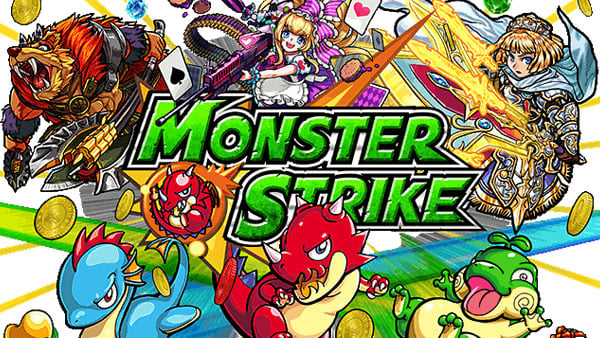

- #GAMES LIKE MONSTER STRIKE MOVIE#
- #GAMES LIKE MONSTER STRIKE ANDROID#
- #GAMES LIKE MONSTER STRIKE PC#
- #GAMES LIKE MONSTER STRIKE TV#
- #GAMES LIKE MONSTER STRIKE FREE#
But like the NPD report, it paints a good picture of what’s making money, what people are downloading, and other trends at the top of the market.Īnd here we go into the charts.
#GAMES LIKE MONSTER STRIKE ANDROID#
Sensor Tower can’t pull data on third-party Android sellers in China.
#GAMES LIKE MONSTER STRIKE PC#
These charts, like The NPD Group’s monthly sales report for console and PC games, doesn’t track every store. Findings like Sensor Tower’s help publishers and developers decide what they should make, which platform they should choose, and what regions are best for their games. Like buying your friends that last round of drinks.Mobile gaming should’ve raked in more than $70 billion in 2018, according to an estimate from Newzoo, another market research firm. (Cynics might argue that the levels are designed so that you tend to fail when you're tantalizingly close to the end.) But in a Monster Strike game, one player can pay to help out the entire group of players. Like many games, Monster Strike gives you the option of paying to extend your health if you die just before finishing a level. "Nor does paying get you to 10 levels beyond where you were before you paid." Skill should get you further than money, Kimura says. "You can't get the strongest character in Monster Strike by paying," he says. *Monster Strike'*s approach to getting users to spend money differs from that of other games, Kimura says.
#GAMES LIKE MONSTER STRIKE FREE#
"In this day and age, going with free is just the clever approach of providing content so it reaches as many users as possible." "We can't do anything about being categorized as a free-to-play or freemium game," said Kimura. Were they worried that there would be a backlash against freemium games, of which Monster Strike is one? WIRED spoke with Okamoto and Kimura days after South Park aired an episode skewering the business of free-to-play mobile games. While it's more likely that such a thing would take place on the crowded, sprawling public transit lines of Tokyo, Mixi says that there has been a significant proportion of multiplayer matches happening this way in U.S.

Monster Strike encourages this behavior by letting you team up with other players, not only across your online friends list but those you happen to be geographically proximal to-fellow train riders, perhaps. >"We can't do anything about being categorized as a free-to-play or freemium game." It's kind of like mobile mini-arcade centers popping up everywhere." You see people gathering at lunch time, or on the train, or just as you get off the train, people are trying to hook up with people nearby. "Right now places in like homes, the household itself is becoming its own mini-arcade. I see a similar movement or shift with mobile vs.
#GAMES LIKE MONSTER STRIKE TV#
But they were smart in making that move to becoming actors on the small box, because now they're the biggest TV actors we have.
#GAMES LIKE MONSTER STRIKE MOVIE#
"There was a time when all these big film actors in Japan started to migrate over into TV, and us as viewers upset-no, this is my movie star, my movie idol. But i know that the future is in the mobile phone market, so that's where I'm headed," he says. "I do feel that maybe i was a little too early for that time, because feature phones never made it outside of Japan. Of course, since those pre-iPhone platforms never made it outside of Japan, his game was stuck there, too, which was painful for the creator of one of the first global game phenomenons in Street Fighter II: "I felt like, no one outside of Japan is going to be able to see my game. He created a mobile game called Dragon Hunter for Japanese feature phones.

Okamoto is quick to stress that he isn't just bandwagoning the iPhone free-to-play gold rush. It would be embarrassing." Tablets, he says, count as mobile devices, so Okamoto feels he can use an iPad at work today without losing face. "I admit that it might be good timing for me to switch back, but it's too late for me.

"Fast forward 12 years, and now my notebook is heavier than everyone's laptop," he says. He'd walk over to subordinates and ask them to print files for him, or do any other task he couldn't accomplish with a mid-2000's Japanese flip phone. He'd write out all of his game design documents in (impeccably neat, at least) paper notebooks. The boss of one of the biggest independent game studios in Japan refused to use a computer. So why not switch over before anyone else did? He'd use his phone for so much business communication and gaming while on the bullet train, and he believed that cell phones were getting so amazing and convenient that they were sure to destroy the PC market. "I was commuting by shinkansen a lot," he said. Right around the time he left Capcom and founded Game Republic, he decided to just stop using PCs altogether. "I have been working without a PC or a computer for about 12 or 13 years," he says.


 0 kommentar(er)
0 kommentar(er)
